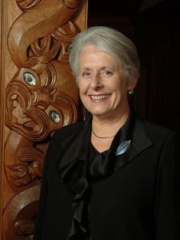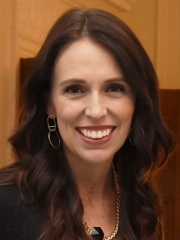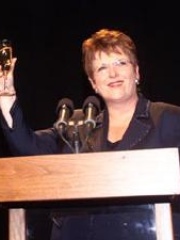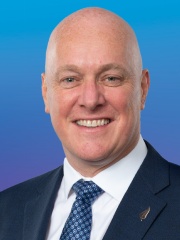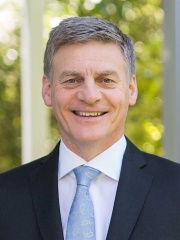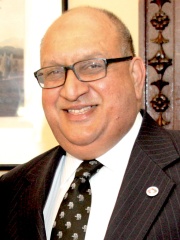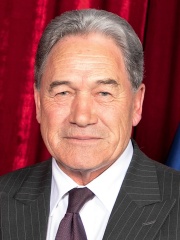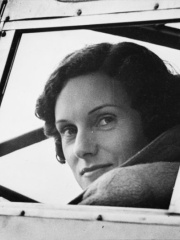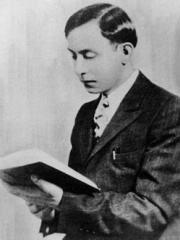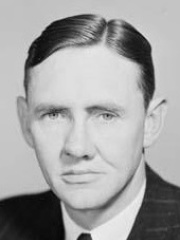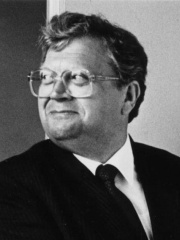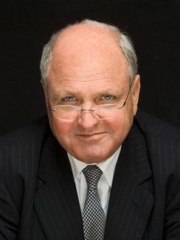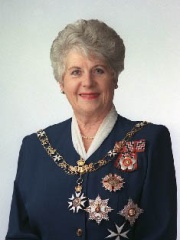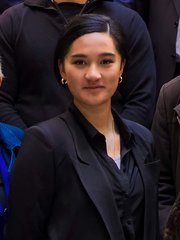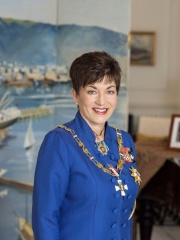
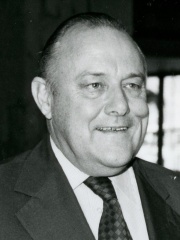
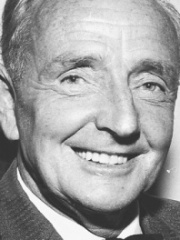
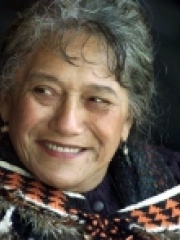

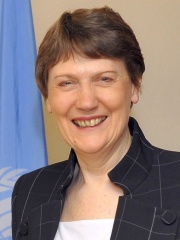
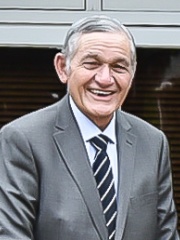
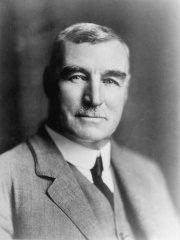
The Most Famous
POLITICIANS from New Zealand
This page contains a list of the greatest New Zealander Politicians. The pantheon dataset contains 19,576 Politicians, 39 of which were born in New Zealand. This makes New Zealand the birth place of the 78th most number of Politicians behind North Macedonia, and Azerbaijan.
Top 10
The following people are considered by Pantheon to be the top 10 most legendary New Zealander Politicians of all time. This list of famous New Zealander Politicians is sorted by HPI (Historical Popularity Index), a metric that aggregates information on a biography's online popularity. Visit the rankings page to view the entire list of New Zealander Politicians.

1. Patsy Reddy (b. 1954)
With an HPI of 65.23, Patsy Reddy is the most famous New Zealander Politician. Her biography has been translated into 32 different languages on wikipedia.
Dame Patricia Lee Reddy (born 17 May 1954) is a New Zealand lawyer and businesswoman who served as the 21st governor-general of New Zealand from 2016 to 2021. Before becoming governor-general, Reddy was a partner of a law firm, headed a major review of intelligence agencies, held multiple directorships, chaired the New Zealand Film Commission and worked as a chief negotiator on Treaty of Waitangi settlements. Prime Minister John Key advised the Queen to appoint Reddy to succeed Sir Jerry Mateparae as the Queen's representative, and Reddy was sworn in for a five-year term on 28 September 2016.

2. Robert Muldoon (1921 - 1992)
With an HPI of 63.37, Robert Muldoon is the 2nd most famous New Zealander Politician. His biography has been translated into 20 different languages.
Sir Robert David Muldoon (; 25 September 1921 – 5 August 1992) was a New Zealand politician who served as the 31st prime minister of New Zealand, from 1975 to 1984, while leader of the National Party. Departing from National Party convention, Muldoon was a right-wing populist and economic nationalist, with a distinctive public persona described as reactionary, aggressive, and abrasive. After a troubled childhood, Muldoon served as a corporal and sergeant in the army in the Second World War. After a career as a cost accountant, he was elected to the House of Representatives at the 1960 general election as the Member of Parliament (MP) for Tamaki, representing the National Party. Muldoon rose in the Second National Government to serve successively as Minister of Tourism (1967), Minister of Finance (1967–1972), and Deputy Prime Minister (1972). Over this time he built up an informal but solid backing amongst National's mostly rural right faction, which he called "Rob's Mob". After National lost the 1972 general election to the Labour Party, Muldoon used his connections to oust moderate party leader Jack Marshall and take his place, becoming Leader of the Opposition in 1974. Through Muldoon's ideological blend of moderate social liberalism and protectionist right-wing populism ("counterpunching", a term he coined) and the promise of a lucrative superannuation scheme, National enjoyed a resurgence. The early death of prime minister Norman Kirk severely weakened the Labour Party, and Muldoon soon led National to a decisive victory in the 1975 general election. Muldoon came to power promising to lead "a Government of the ordinary bloke". He appointed himself Minister of Finance. Although he used populist rhetoric to rail against elites and the political establishment, he consistently tried to centralise power under himself during his premiership. His tenure was plagued by an economic pattern of stagnation, high inflation, growing unemployment, and high external debts and borrowing. Economic policies of the Muldoon Government included national superannuation, wage and price freezes, industrial incentives, and the Think Big industrial projects. He reintroduced and intensified the previous government's policies of the Dawn Raids, which racially targeted Pasifika overstayers. To engage with crime, Muldoon built "unusually close relationships" with criminal gangs; he personally favoured Black Power, and he and his wife Thea met with them on several occasions. In foreign policy, Muldoon adopted an anti-Soviet stance and re-emphasised New Zealand's defence commitments to the United States and Australia under the ANZUS pact. His refusal to stop a Springbok rugby tour of New Zealand divided the country and led to unprecedented civil disorder in 1981. Muldoon became more and more controversial as his premiership progressed; in addition to the controversy of the Springbok tour, he began a smear campaign against Labour MP Colin Moyle for alleged illegal homosexual activities and punched demonstrators at a protest. Muldoon led his party to two additional election victories in 1978 and 1981, with the first-past-the-post electoral system keeping him in power despite losing the popular vote in each election except 1975. At the 1984 snap election, which Muldoon infamously announced while intoxicated on live television, National finally suffered a significant defeat to Labour. Shortly before leaving office, amid a constitutional crisis, Muldoon was forced by the incoming Government to devalue the New Zealand dollar. In 1984, he was only the second prime minister (after Sir Keith Holyoake) to receive a knighthood while still in office. Mounting legal costs encouraged Muldoon to pursue a novelty acting career, but he remained in parliament until his retirement in 1992. He died shortly thereafter; the gang Black Power performed a haka at his funeral.

3. Burt Munro (1899 - 1978)
With an HPI of 63.14, Burt Munro is the 3rd most famous New Zealander Politician. His biography has been translated into 19 different languages.
Herbert James "Burt" Munro (Bert in his youth; 25 March 1899 – 6 January 1978) was a motorcycle racer from New Zealand, famous for setting an under-1,000 cc world record, at Bonneville, on 26 August 1967. This record still stands; Munro was 68 and was riding a 47-year-old machine when he set his last record. Working from his home in Invercargill, he spent 20 years highly modifying the 1920 Indian Scout (motorcycle) that he had bought that year. Munro set his first New Zealand speed record in 1938, and later set seven more. He travelled to compete at the Bonneville Salt Flats, attempting to set world speed records. During his ten visits to the salt flats, he set three speed records, one of which still stands. His efforts, and success, are the basis of the film The World's Fastest Indian (2005), starring Anthony Hopkins, and an earlier 1971 short documentary film Burt Munro: Offerings to the God of Speed, both directed by Roger Donaldson.

4. Te Atairangikaahu (1931 - 2006)
With an HPI of 62.82, Te Atairangikaahu is the 4th most famous New Zealander Politician. Her biography has been translated into 20 different languages.
Dame Te Atairangikaahu (born Pikimene Korokī Mahuta, 23 July 1931 – 15 August 2006) reigned as Māori Queen from 1966 until her death in 2006. Her reign was the longest of any Māori monarch. Her full name and title was Te Arikinui Dame Te Atairangikaahu. Her title Te Arikinui (meaning Paramount Chief) and name Te Atairangikaahu (meaning the hawk of the morning sky) were bestowed when she became monarch. Her full whakapapa (lineage) name, linking her to previous Māori monarchs, was Te Atairangikaahu Korokī Te Rata Mahuta Tāwhiao Pōtatau Te Wherowhero.
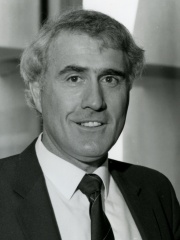
5. Geoffrey Palmer (b. 1942)
With an HPI of 62.23, Geoffrey Palmer is the 5th most famous New Zealander Politician. His biography has been translated into 18 different languages.
Sir Geoffrey Winston Russell Palmer (born 21 April 1942) is a New Zealand lawyer and former politician who was a member of Parliament from 1979 to 1990. He served as the 33rd prime minister of New Zealand for a little over a year, from August 1989 until September 1990, leading the Fourth Labour Government. As minister of justice from 1984 to 1989, Palmer was responsible for considerable reforms of the country's legal and constitutional framework, such as the creation of the Constitution Act 1986, New Zealand Bill of Rights Act 1990, Imperial Laws Application Act 1988, and the State Sector Act 1988. He served as president of the New Zealand Law Commission, from 2005 to 2010.

6. Bill Pickering (1910 - 2004)
With an HPI of 61.90, Bill Pickering is the 6th most famous New Zealander Politician. His biography has been translated into 17 different languages.
William Hayward Pickering (24 December 1910 – 15 March 2004) was a New Zealand-born aerospace engineer who headed Pasadena, California's Jet Propulsion Laboratory (JPL) for 22 years, retiring in 1976. He was a senior NASA luminary and pioneered the exploration of space. Pickering was also a founding member of the United States National Academy of Engineering.

7. Helen Clark (b. 1950)
With an HPI of 61.36, Helen Clark is the 7th most famous New Zealander Politician. Her biography has been translated into 67 different languages.
Helen Elizabeth Clark (born 26 February 1950) is a New Zealand politician who served as the 37th prime minister of New Zealand from 1999 to 2008 and was the administrator of the United Nations Development Programme from 2009 to 2017. She was New Zealand's fifth-longest-serving prime minister, and the second woman to hold that office. Clark was brought up on a farm outside Hamilton. She entered the University of Auckland in 1968 to study politics and became active in the New Zealand Labour Party. After graduating she lectured in political studies at the university. Clark entered local politics in 1974 in Auckland but was not elected to any position. Following one unsuccessful attempt, she was elected to Parliament in 1981 as the member for Mount Albert, an electorate she represented until 2009. Clark held numerous Cabinet positions in the Fourth Labour Government, including minister of housing, minister of health and minister of conservation. She was the 11th deputy prime minister of New Zealand from 1989 to 1990 serving under prime ministers Geoffrey Palmer and Mike Moore. After Labour's narrow defeat in the 1993 election, Clark challenged Moore for leadership of the party and won, becoming the leader of the Opposition. Following the 1999 election, Labour formed a governing coalition, and Clark was sworn in as prime minister on 10 December 1999. Clark led the Fifth Labour Government, which implemented several major economic initiatives including Kiwibank, the New Zealand Superannuation Fund, the New Zealand Emissions Trading Scheme and KiwiSaver. Her government also introduced the Foreshore and Seabed Act 2004, which caused major controversy. In foreign affairs, Clark sent troops to the Afghanistan War, but did not contribute combat troops to the Iraq War, and ordered deployment to the 2006 East Timorese crisis. She was ranked by Forbes as the 20th-most powerful woman in the world in 2006. She advocated a number of free-trade agreements with major trading partners, including becoming the first developed nation to sign such an agreement with China. After three successive electoral victories, her government was defeated in the 2008 election; Clark resigned as prime minister and party leader on 19 November 2008. She was succeeded as prime minister by John Key of the National Party, and as leader of the Labour Party by Phil Goff. Clark resigned from Parliament in April 2009 to become the first female head of the United Nations Development Programme (UNDP). In 2016, she stood for the position of secretary-general of the United Nations, but was unsuccessful. She left her UNDP administrator post on 19 April 2017 at the end of her second four-year term and was succeeded by Achim Steiner. In 2019, Clark became the patron of the Helen Clark Foundation.

8. Tūheitia Paki (1955 - 2024)
With an HPI of 61.34, Tūheitia Paki is the 8th most famous New Zealander Politician. His biography has been translated into 26 different languages.
Tūheitia Pōtatau Te Wherowhero VII GCCT KStJ KCLJ (born Tūheitia Paki; 21 April 1955 – 30 August 2024), crowned as Kīngi Tūheitia, reigned as the Māori King from 2006 until his death in 2024. He was the eldest son of the previous Māori monarch, Te Arikinui Dame Te Atairangikaahu, and was announced as her successor and crowned on 21 August 2006, the final day of her tangi. Tūheitia was patron to Te Matatini, the largest Māori cultural festival, and also of Kirikiriroa Marae in Hamilton. He signed a formal accord with the Department of Corrections in 2017 that led to the establishment of iwi justice panels, as well as centres for female prisoners to reintegrate into prison life after giving birth. He made numerous state visits and met with other monarchs, including Charles III at the latter's coronation in 2023. Tūheitia also advocated for Māori survivors of climate change in the aftermath of Cyclone Gabrielle. Among his activities, he involved himself in politics, as does the Kīngitanga as an institution. In January 2024, he held a national hui of Māori unity to respond to the policies of the Sixth National Government towards Māori and the Treaty of Waitangi, which the Kīngitanga believed were regressive and would reverse "decades of hard fought justice." Tūheitia struggled with poor health throughout his life. In 2024, over a week after his eighteenth koroneihana (coronation anniversary), he died in hospital following cardiac surgery. He was succeeded by his daughter Nga wai hono i te po on the day of his funeral.

9. George Forbes (1869 - 1947)
With an HPI of 59.33, George Forbes is the 9th most famous New Zealander Politician. His biography has been translated into 15 different languages.
George William Forbes (; 12 March 1869 – 17 May 1947) was a New Zealand politician who served as the 22nd prime minister of New Zealand from 28 May 1930 to 6 December 1935. He was the last leader of the remnant of the Liberal Party and having entered the House of Representatives in 1908 as a Radical in that Party, he went on to become a founder of the New Zealand National Party in 1936. Forbes was born in Lyttelton near Christchurch and he later began farming at Cheviot, North Canterbury. He became active in local politics. Forbes was first elected as a Liberal Party member of parliament in 1908 for the North Canterbury electorate of Hurunui. From the mid-1920s the Liberal Party changed its name twice and Forbes was elected leader in 1925, shortly after it had adopted the name National Party. He was the leader in 1928 when the Party changed its name to the United Party, he was again elected leader in May 1930, and he initially led the newly created National Party in 1936. His rise to power as Prime Minister was somewhat unexpected, until he became the obvious successor to an increasingly incapacitated Sir Joseph Ward in 1930. It was his misfortune to take office during the very worst period of the Great Depression. He nevertheless remained in power for over five years. Forbes headed the United–Reform coalition Government that eventually became the current day New Zealand National Party. Often referred to as "Honest George", Forbes had a reputation for probity, considerable debating skill, a good memory, and that most essential of skills in a party leader, an ability to assess the mood of the House. A man of equable disposition and simple tastes, his courteous and friendly attitude earned him the liking and respect of parliamentarians from all sides of the House. Throughout his time in national politics his Hurunui constituents held Forbes in high regard: during his tenure as Prime Minister he would roll up his sleeves and help load sheep on the railway wagons for market. Illustrating the wide-spread sentiment about Forbes personally, even in the closing weeks of his government, Independant candidate and newspaper editor Oliver Duff opened his election campaign against Forbes in Hurunui in October 1935, telling his audience that, "Mr Forbes was precisely the kind of man most people thought he was. He had never seen a Prime Minister with less pretence or swank. He was courteous, fair, and a genuinely modest man."
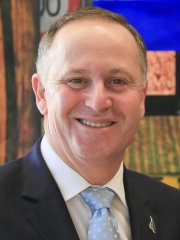
10. John Key (b. 1961)
With an HPI of 58.61, John Key is the 10th most famous New Zealander Politician. His biography has been translated into 67 different languages.
Sir John Phillip Key (born 9 August 1961) is a New Zealand retired politician who served as the 38th prime minister of New Zealand from 2008 to 2016 and as leader of the National Party from 2006 to 2016. Following his father's death when he was eight, Key was raised by his single mother in a state-house in the Christchurch suburb of Bryndwr. He attended the University of Canterbury and graduated in 1981 with a Bachelor of Commerce. He began a career in the foreign exchange market in New Zealand before moving overseas to work for Merrill Lynch, in which he became head of global foreign exchange in 1995, a position he would hold for six years. In 1999 he was appointed a member of the Foreign Exchange Committee of the Federal Reserve Bank of New York until leaving in 2001. Key entered the New Zealand Parliament representing the Auckland electorate of Helensville as one of the few new National members of parliament in the election of 2002 following National's significant defeat of that year. In 2004, he was appointed Finance Spokesman for National and eventually succeeded Don Brash as the National Party leader in 2006. After two years as leader of the Opposition, Key led his party to victory at the November 2008 general election. He was subsequently sworn in as prime minister on 19 November 2008. The National government went on to win two more general elections under his leadership: in November 2011 and September 2014. Key was expected to contest for a fourth term of office at the 2017 general election, but on 5 December 2016 he resigned as prime minister and leader of the National Party. He was succeeded by Bill English on 12 December 2016. After resigning from both posts in December 2016 and leaving politics, Key was appointed to the board of directors and role of chairman in several New Zealand corporations. As prime minister, Key led the Fifth National Government of New Zealand which entered government at the beginning of the late-2000s recession in 2008. He was described as supporting both socially liberal and economically liberal policies. Key was worth an estimated USD$35 million in 2016, making him the wealthiest individual ever to assume the premiership. In his first term, Key's government implemented a GST rise and personal tax cuts, while enacting several austerity measures. His government refused to renew license agreements for multiple television channels, including TVNZ 6, TVNZ 7, Kidzone and Heartland, while reducing funding for Radio New Zealand in real terms. In February 2011, after a major earthquake in Christchurch the nation's second largest city significantly affected the national economy, the government formed the Canterbury Earthquake Recovery Authority. In its second term, Key's government implemented a policy of partial privatisation of five state-owned enterprises, while voters in a citizens-initiated referendum on the issue were 2 to 1 opposed to the policy. He also faced a severe housing crisis, especially in Auckland, and was widely criticised for a perceived lack of action. In foreign policy, Key withdrew New Zealand Defence Force personnel from their deployment in the war in Afghanistan, signed the Wellington Declaration with the United States and pushed for more nations to join the Trans-Pacific Partnership.
People
Pantheon has 39 people classified as New Zealander politicians born between 1869 and 1982. Of these 39, 19 (48.72%) of them are still alive today. The most famous living New Zealander politicians include Patsy Reddy, Geoffrey Palmer, and Helen Clark. The most famous deceased New Zealander politicians include Robert Muldoon, Burt Munro, and Te Atairangikaahu. As of April 2024, 1 new New Zealander politicians have been added to Pantheon including Hana-Rawhiti Maipi-Clarke.
Living New Zealander Politicians
Go to all RankingsPatsy Reddy
1954 - Present
HPI: 65.23
Geoffrey Palmer
1942 - Present
HPI: 62.23
Helen Clark
1950 - Present
HPI: 61.36
John Key
1961 - Present
HPI: 58.61
Silvia Cartwright
1943 - Present
HPI: 56.07
Jacinda Ardern
1980 - Present
HPI: 54.82
Jenny Shipley
1952 - Present
HPI: 54.23
Juliet Mitchell
1940 - Present
HPI: 52.68
Christopher Luxon
1970 - Present
HPI: 52.47
Bill English
1961 - Present
HPI: 52.13
Anand Satyanand
1944 - Present
HPI: 50.55
Winston Peters
1945 - Present
HPI: 49.08
Deceased New Zealander Politicians
Go to all RankingsRobert Muldoon
1921 - 1992
HPI: 63.37
Burt Munro
1899 - 1978
HPI: 63.14
Te Atairangikaahu
1931 - 2006
HPI: 62.82
Bill Pickering
1910 - 2004
HPI: 61.90
Tūheitia Paki
1955 - 2024
HPI: 61.34
George Forbes
1869 - 1947
HPI: 59.33
Jean Batten
1909 - 1982
HPI: 55.11
Wallace Fard Muhammad
1893 - 1934
HPI: 54.87
John Gorton
1911 - 2002
HPI: 54.10
David Lange
1942 - 2005
HPI: 53.49
Mike Moore
1949 - 2020
HPI: 52.19
Catherine Tizard
1931 - 2021
HPI: 51.91
Newly Added New Zealander Politicians (2025)
Go to all RankingsOverlapping Lives
Which Politicians were alive at the same time? This visualization shows the lifespans of the 19 most globally memorable Politicians since 1700.

